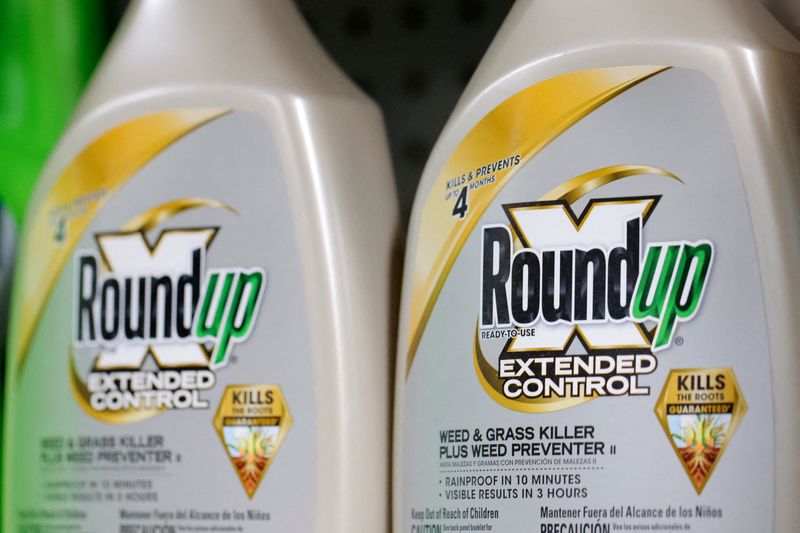Judge slashes Bayer $1.56 billion Roundup verdict to $611 million By Reuters
[ad_1]
By Nate Raymond and Jonathan Stempel
(Reuters) – A Missouri judge slashed a $1.56 billion verdict against Bayer (OTC:) to $611 million for three people who claimed its Roundup weed killer caused their cancer, by reducing punitive damages. Bayer said on Friday it is appealing.
The German company’s Monsanto (NYSE:) unit had been found liable in November by a Cole County, Missouri, jury to Valorie Gunther of New York, Jimmy Draeger of Missouri and Daniel Anderson of California, who blamed their non-Hodgkin’s lymphoma on their exposure to Roundup.
Jurors found Monsanto liable for negligence, design defects and failing to warn about Roundup’s risks. They awarded $61.1 million of compensatory damages and $1.5 billion of punitive damages, with the latter divided equally among the plaintiffs.
In orders on March 15, Judge Daniel Green let the $61.1 million component stand, but reduced punitive damages to nine times that amount, or $549.9 million.
The U.S. Supreme Court has said that punitive damages should generally not be more than nine times compensatory damages.
Bayer had sought to throw out the verdict, as well as reduce damages, and filed a notice of appeal on March 22.
It has said decades of studies have shown that Roundup and its active ingredient glyphosate are safe.
“While the court reduced the unconstitutionally excessive damage award, the company believes that the court did not apply the law correctly on damages,” Bayer said on Friday. “We also disagree with the ruling on the liability verdict as it is at odds with the extensive weight of scientific evidence.”
Bart Rankin, a lawyer for the plaintiffs, said in a statement the reduced awards are “unassailably constitutional,” and “align with the evidence of Monsanto’s willful, malicious, and reckless disregard for the safety of consumers and the injuries suffered by these plaintiffs.”
Roundup is among the most widely used weedkillers in the United States, though Bayer phased out sales for home use last year.
Bayer has faced extensive litigation over whether Roundup causes cancer since it bought Monsanto for $63 billion in 2018.

It agreed to settle much of that litigation for $10.9 billion in 2020, but failed to resolve future cases. About 113,000 of the 167,000 claims that Bayer has faced have been settled or deemed ineligible.
Though Bayer has won the majority of its more recent Roundup trials, plaintiffs have won more than $4 billion of verdicts, including $2.25 billion in a single case in January. Bayer is appealing those verdicts.
[ad_2]
Source link
By Nate Raymond and Jonathan Stempel
(Reuters) – A Missouri judge slashed a $1.56 billion verdict against Bayer (OTC:) to $611 million for three people who claimed its Roundup weed killer caused their cancer, by reducing punitive damages. Bayer said on Friday it is appealing.
The German company’s Monsanto (NYSE:) unit had been found liable in November by a Cole County, Missouri, jury to Valorie Gunther of New York, Jimmy Draeger of Missouri and Daniel Anderson of California, who blamed their non-Hodgkin’s lymphoma on their exposure to Roundup.
Jurors found Monsanto liable for negligence, design defects and failing to warn about Roundup’s risks. They awarded $61.1 million of compensatory damages and $1.5 billion of punitive damages, with the latter divided equally among the plaintiffs.
In orders on March 15, Judge Daniel Green let the $61.1 million component stand, but reduced punitive damages to nine times that amount, or $549.9 million.
The U.S. Supreme Court has said that punitive damages should generally not be more than nine times compensatory damages.
Bayer had sought to throw out the verdict, as well as reduce damages, and filed a notice of appeal on March 22.
It has said decades of studies have shown that Roundup and its active ingredient glyphosate are safe.
“While the court reduced the unconstitutionally excessive damage award, the company believes that the court did not apply the law correctly on damages,” Bayer said on Friday. “We also disagree with the ruling on the liability verdict as it is at odds with the extensive weight of scientific evidence.”
Bart Rankin, a lawyer for the plaintiffs, said in a statement the reduced awards are “unassailably constitutional,” and “align with the evidence of Monsanto’s willful, malicious, and reckless disregard for the safety of consumers and the injuries suffered by these plaintiffs.”
Roundup is among the most widely used weedkillers in the United States, though Bayer phased out sales for home use last year.
Bayer has faced extensive litigation over whether Roundup causes cancer since it bought Monsanto for $63 billion in 2018.

It agreed to settle much of that litigation for $10.9 billion in 2020, but failed to resolve future cases. About 113,000 of the 167,000 claims that Bayer has faced have been settled or deemed ineligible.
Though Bayer has won the majority of its more recent Roundup trials, plaintiffs have won more than $4 billion of verdicts, including $2.25 billion in a single case in January. Bayer is appealing those verdicts.